Filter by
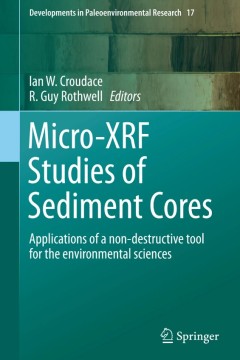
Micro-XRF Studies of Sediment Cores
This volume presents papers on the use of micro-XRF core scanners in palaeoenvironmental research. It contains a broad ranging view of instrument capability and points to future developments that will help contribute to higher precision elemental data and faster core analysis. Readers will find a diverse range of research by leading experts that have used micro-XRF core scanners in a wide range…
- Edition
- 1
- ISBN/ISSN
- 978-94-017-9848-8
- Collation
- XXXIX, 656
- Series Title
- Developments in Paleoenvironmental Research
- Call Number
- -
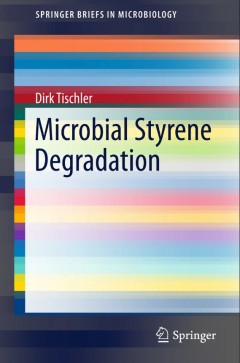
Microbial Styrene Degradation
This book describes the complex processes involved in styrene degradation by microbes, including highly adaptive microorganisms, the various enzymes involved in styrene biodegradation, new styrene-catabolic routes, novel regulatory mechanisms, and the genes coding for styrene metabolizing enzymes. Numerous biotechnological applications are discussed, such as the development of sustainable eco-f…
- Edition
- 1
- ISBN/ISSN
- 978-3-319-24860-8
- Collation
- XIV, 108
- Series Title
- SpringerBriefs in Microbiology
- Call Number
- -
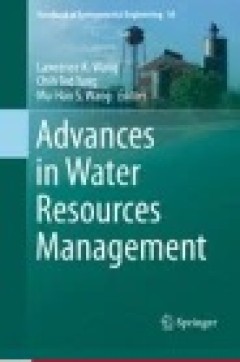
Advances in Water Resources Management
This volume provides in-depth coverage of such topics as multi-reservoir system operation theory and practice, management of aquifer systems connected to streams using semi-analytical models, one-dimensional model of water quality and aquatic ecosystem-ecotoxicology in river systems, environmental and health impacts of hydraulic fracturing and shale gas, bioaugmentation for water resources prot…
- Edition
- Ed. 1
- ISBN/ISSN
- 978-3-319-22924-9
- Collation
- XII, 569
- Series Title
- Handbook of Environmental Engineering
- Call Number
- 628.5 ADV a
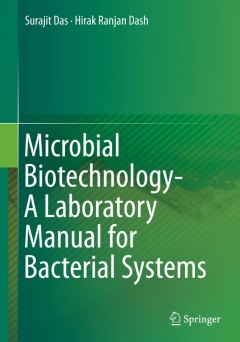
Microbial Biotechnology- A Laboratory Manual for Bacterial Systems
Microorganisms play an important role in the maintenance of the ecosystem structure and function. Bacteria constitute the major part of the microorganisms and possess tremendous potential in many important applications from environmental clean up to the drug discovery. Much advancement has been taken place in the field of research on bacterial systems. This book summarizes the experimental setu…
- Edition
- 1
- ISBN/ISSN
- 978-81-322-2094-7
- Collation
- XVI, 239
- Series Title
- -
- Call Number
- -
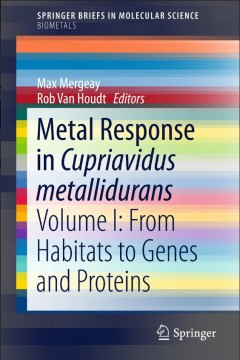
Metal Response in Cupriavidus metallidurans:Volume I: From Habitats to Genes …
This book is the first volume of a two-volume set summarizing 40 years of key research findings directly related to metal-resistant Cupriavidus/Ralstonia (Betaproteobacteria). In this first volume, the historical and geographical context of these bacteria, which are mostly found in industrial and polluted environments linked to zinc and other non-ferrous metallurgy, is sketched to illustrate th…
- Edition
- 1
- ISBN/ISSN
- 978-3-319-20593-9
- Collation
- IX, 89
- Series Title
- SpringerBriefs in Molecular Science
- Call Number
- -
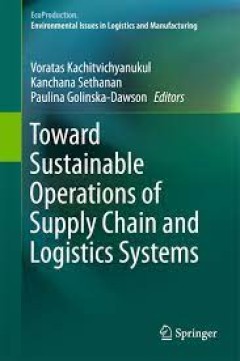
Toward Sustainable Operations of Supply Chain and Logistics Systems
This book addresses critical issues in today’s logistics operations and supply chain management, with a special focus on sustainability. In dedicated chapters the authors address aspects concerning multimode logistics operations, reverse network configuration, forward and reverse supply chain integration, improvement of the production operations and management of the recovery activities, as w…
- Edition
- 1
- ISBN/ISSN
- 978-3-319-19005-1
- Collation
- XI, 550
- Series Title
- EcoProduction
- Call Number
- -
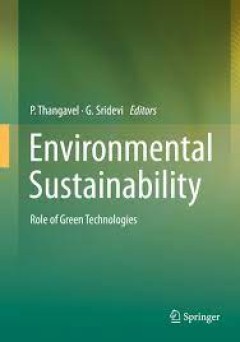
Environmental Sustainability Role of Green Technologies
Covers different categories of green technologies (e.g. biofuels, renewable energy sources, phytoremediation etc.,) in a nutshell -Focuses on next generation technologies which will help to attain the sustainable development -The chapters widely cover for students, faculties and researchers in the scientific arena of Environmentalists, Agriculturalists, Engineers and Policy Makers The World Env…
- Edition
- -
- ISBN/ISSN
- 978-81-322-2056-5
- Collation
- 26 b/w illustrations, 32 illustrations in colour
- Series Title
- -
- Call Number
- -
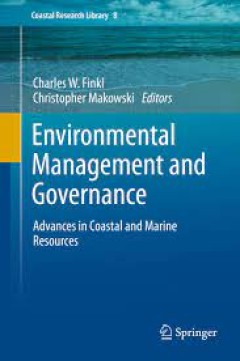
Environmental Management and Governance Advances in Coastal and Marine Resou…
This book deals with recent advances in coastal marine environmental management and governance. Various chapters consider new aspects of conservation, assessment of ecosystem health status, environmental survey and protection, frameworks of ocean service and governance, new applications of geo processing and GIS technology, beach management, aquaculture site selection, assessment of water quali…
- Edition
- -
- ISBN/ISSN
- 978-3-319-06305-8
- Collation
- 33 b/w illustrations, 120 illustrations in colour
- Series Title
- -
- Call Number
- -
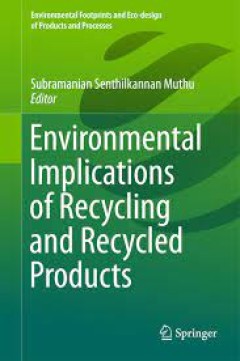
Environmental Implications of Recycling and Recycled Products
This book includes details on the environmental implications of recycling, modeling of recycling, processing of recycled materials, recycling potential of materials, characterisation of recycled materials, reverse logistics, case studies of recycling various materials etc.
- Edition
- -
- ISBN/ISSN
- 978-981-287-643-0
- Collation
- 48 b/w illustrations
- Series Title
- -
- Call Number
- -
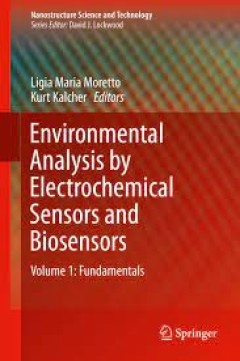
Environmental Analysis by Electrochemical Sensors and Biosensors Applications
This book discusses in detail the analysis and monitoring of the most important analytes in the environmental field. It also reviews the implementation, realization and application of sensor designs mentioned in the first volume of this set, dividing the coverage into global parameters, sensors of organics and sensors of inorganics.
- Edition
- -
- ISBN/ISSN
- 978-1-4939-1301-5
- Collation
- 65 b/w illustrations, 28 illustrations in colour
- Series Title
- -
- Call Number
- -
 Computer Science, Information & General Works
Computer Science, Information & General Works  Philosophy & Psychology
Philosophy & Psychology  Religion
Religion  Social Sciences
Social Sciences  Language
Language  Pure Science
Pure Science  Applied Sciences
Applied Sciences  Art & Recreation
Art & Recreation  Literature
Literature  History & Geography
History & Geography